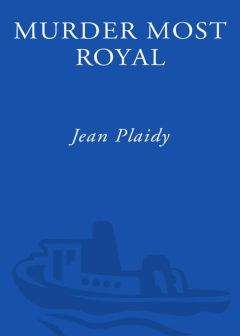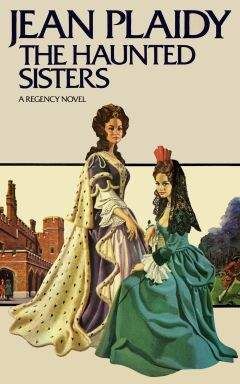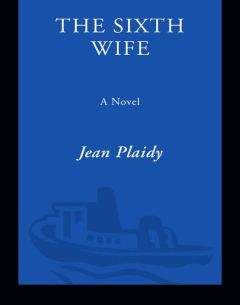“That is true. My mother would often talk to me of Spain.” Her mouth squared, as it always did when she spoke of her mother. “I longed to visit that country and know more of my mother’s people.”
“And now one of them comes forth to wed you.”
“There was talk, at one time, that I should marry your father.”
“That was when you were a baby and he a young man.”
“He wrote to me recently and said he remembered that he was once affianced to me. He said it was ever a matter of regret with him that nothing came of it. He said he was sending me his son, who was young, handsome, and strong, while he had grown ugly, old, and tired. Why, had I married him you might be my son!”
“Impossible! Impossible! We are of an age.”
She was pleased. Did she really think that he did not know she was eleven years older than he was? That was impossible, for time had not been very gracious to her. It had engraved its marks on her face—lines of suffering, lines of bitterness, anxiety, and sickness. Poor Mary!
He said: “What must you think of me—unable to speak your language?”
“I will teach it to you … Philip.”
“I trust, Mary, that I shall be an apt pupil in all that you teach me.”
“Nay, you must be the one to teach, I the one to learn.”
Yes, he thought; that must be. I must make you see that I will govern this kingdom in accordance with the Emperor’s wishes.
He longed to leave her, but now she was growing bolder. She let her hand rest on his sleeve. He looked at it, and with an effort he took those heavily ringed fingers in his. She was smiling and he could feel her trembling as he raised her hand to his lips.
He knew that he was watched, that the English were saying: “He is winning the Queen’s heart with his chivalrous Spanish manners.” And the Spaniards were saying: “We did not know Philip. What a man he is! He can act any part for the glory of Spain, for he surely cannot be as enamored of the old lady as he pretends to be—particularly when some of the other ladies are so charming.”
At length Philip said: “I will not keep you from your sleep any longer, gracious lady. Now you shall teach me to say ‘Goodnight’ in English, and I shall say it to the ladies here and in the next room. Then I shall leave you until the morning.”
She enjoyed teaching him the words for he found them so difficult to say. “Goodnight. Goodnight …” The Queen burst into merry laughter and brought her face close to Philip’s. “No … this way. Goodnight. You see? Goodnight.”
Then Philip kissed her hand and went to the door of that room in which the ladies were, and there he cried out in Latin: “But I have forgotten. What is it? Gooda … What is it?”
Then, while the Queen smiled in almost childish pleasure, he went back to her and learned the words again; then he went to the ladies and said it in such a manner as to set them all laughing and repeating “Goodnight” with that Spanish accent which they said was so charming.
“Your Highness,” said Ruy, when they were alone, “goes from strength to strength. Why, the lady dotes on you already.”
But his words did not please Philip. He had discarded the gay mask of the wooer and become the sober young man whom his friends knew so well.
In the Queen’s bedchamber her ladies were helping her to disrobe.
Mistress Clarencius, her old nurse, whom Mary regarded as one of her true friends, was obviously in a state of high delight.
“He is a lovely little King,” she declared. “I thank God for the day he landed here to make your Majesty the good husband I know he will.”
Tall Magdalen Dacre said: “How magnificent he looked, your Majesty! And he had eyes for none but yourself!”
Mary said sadly: “But he is so much younger than I.”
“None would guess it, your Majesty.”
But Mary knew that they did not speak the truth.
Jane Dormer had said nothing, and, turning to her, the Queen inquired: “And what think you, Jane? What thought you of our visitors?”
“The Spanish gentlemen are very handsome, your Majesty. And it is a great joy to us to know that your Grace is to marry a strong adherent of the Holy Catholic Church.”
Janet was thinking of the handsome Count of Feria, whom she had found at her side in the gallery. They had talked together, for he spoke English with remarkable fluency. Jane was as excited as her mistress; if she was struck with the handsomeness of the Spanish gentlemen, Feria had been equally impressed with the beauty of at least one English girl.
Mary looked at Jane and smiled, for she had noticed her with Feria during the evening; she had felt envious of the girl’s youth and beauty. How wonderful it must be to attract by those qualities, she thought, and not because one was the daughter of a king.
They put her to bed and drew the curtains. “Your Majesty must sleep well,” they told her.
But how could she sleep? She had seen him, and he was kind and gentle; he would be loving and tender, she was sure.
But was she as foolish as a young girl to imagine he had really meant those handsome compliments which he had paid her? Did she not know the truth? Strip her of her silks and velvets, take away her jewels, and what was left but a plain, aging woman who had lost almost everything in life but her throne?
Courtenay had deceived her; he had pretended to love her, and all the time he was plotting to marry her younger and more attractive sister Elizabeth, and take the throne from her. Courtenay and Elizabeth had both deceived her; they treated her with great respect because she wore the crown, but they were awaiting their opportunities to destroy her.
Gardiner and Renard, the Spanish Ambassador, had tried to persuade her to have Elizabeth executed. Why did she not? Would it have been so difficult to prove her guilty of treachery? Had not her name been mentioned in connection with the Wyatt rebellion? But she could not forget Elizabeth … Elizabeth as a little girl of three, so desolate, so alone, when her mother fell from favor. Although their mothers had been so different, they had the same father—there was no doubt of that. They were sisters.
What a bitter childhood Mary’s had been! The grand marriages which had been prepared for her had all come to nothing, for the King had sworn that her mother was no true wife to him, and Mary who had been the beloved daughter, became a bastard. How many times had her life been in danger, not only from sickness, but from the axe?
And now she was thirty-eight—old for any woman, but for one who had passed through such desperate hazards desperately old; and now a young man had come from across the seas to marry her.
She smiled, thinking of him. He was beautiful with his trim figure, his golden hair and beard, his pale skin. When she had touched him she had thrilled with pleasure … more than pleasure—excitement. She was a virgin; she had never dared think of carnal love before this; if in her youth the sight of a handsome man had aroused such thoughts, they had been instantly suppressed; she had stifled her feelings then by kneeling before her altar, until she was cramped with pain, and must think of that rather than the strong arms of a lover.
But carnal love had become legitimate love. Love between herself and Philip must be more than pleasure; it must be duty. Without it, how could they produce the heir for which England and Spain were waiting?
So now … there need be no suppression. Now thoughts could run riot like mischievous children in hitherto forbidden gardens.
“Philip,” she murmured; and all through the night she dreamed of him.
They were married in the beautiful Cathedral of Winchester. Gardiner, with the help of three bishops, performed the ceremony; and not since the days of the Queen’s great father had such pomp been seen.
The greatest nobles of Spain and England were assembled in the Cathedral. Many of the English—chief of whom was Bishop Gardiner—were in a state of exultation, for they saw in the marriage that for which they had long prayed since King Henry broke with the Pope: the return of England to Rome.
After the ceremony had been performed, Philip and Mary, surrounded by the noblemen of both countries, went to the Bishop’s Palace, where a great feast was awaiting them.
Here dishes were served with the utmost ceremony, as though the food itself were royal. The minstrels played gay music while the guests ate; but all the Spanish guests were furious because Philip ate from a silver plate while Mary had a gold one. They realized that these people meant to show them that Mary was Queen of England, Philip but the Consort; and that England would be ruled by the English.
It was a matter over which hot-headed Spaniards would have drawn the sword had they not been warned against this by Philip himself. They must content themselves with smiling at the Queen’s loving expression when her eyes fell on Philip. Soon she would be his slave; then her parliament and her courtiers would follow.
Nor were the Spaniards allowed to serve Philip at table.
“Nay,” said the hearty English: “he is our guest. He has married our Queen and we demand the privilege of serving him.”
And what could be done? Nothing. The Spaniards could only marvel at these people, at their crudeness, their huge appetites, and their ability to sweep aside etiquette and make the rules which best suited themselves. Spanish discipline was needed here, thought the guests. Let them wait until Philip’s son was born! Let them wait until the Holy Inquisition was set up in this land!
The Queen gave the toast of her guests, and this she drank from a golden cup. Then she drank the health of her husband, whose titles were proclaimed by a handsome herald. “King of England, Naples, and Jerusalem, Prince of Spain, and Count of Flanders.”
And every eye of every Spaniard gleamed with loving devotion.
To Philip it seemed that the celebrations would never end, yet he dreaded their climax. Mary was growing fonder of him with every passing moment. What tenderness had she known in her life? Very little. And when this young man—one day to be the greatest monarch in the world—showed her kindness, it was almost more than she could bear. All her feelings, so carefully suppressed, were about to burst forth like a river in flood; she was longing for the consummation of her marriage. This Philip had everything to offer her; youth, quiet dignity—which penetrated his new aspect of bonhomie—tenderness, kindliness, and understanding. Mary was happier at her wedding feast than she had ever before been in the whole of her life. There was one thing she regretted besides her lost youth—that her mother could not see her now. How happy Katharine of Aragon would have been to see her daughter, Queen of England, married to her kinsman, that together they might rule the world while they led it to the only true faith.
After the banquets the great ball began. To the Spaniards and the English this was a further cause for dissension. For could Spaniards dance the crude English dances? It seemed to them that the English had no notion of grace; they pranced, leaped, and laughed as they danced, as though a dance were an expression of joy rather than of grace. They laughingly declared—in their barbaric tongue, which only a few of their guests could understand—that if the Spanish dances were danced they would all die of laughing, for such laughter as they would be unable to suppress would result in death after such a surfeit of beef, mutton, and roast peacock. As for the grandees, the hidalgos, and the stately dons, how could they so fling their arms about? How could they leap into the air, guffawing as they did so?
Only the King and the Queen seemed to find the contrast between Spanish and English customs amusing. Philip, charming and courtly, discovered that the English knew the German style of dancing, which was not quite so crude as the English and was known to the Spaniards. So, in German fashion, they danced, led by the short, trim Philip in his dazzling wedding garments, hand-in-hand with the Queen, who was made almost handsome by the glitter of jewels and the shine of happiness.
Had that been all that was demanded of him, Philip would have felt great relief. But now the night was upon them. He and his Queen had been disrobed; their attendants had retired, and all but a few candles doused.
She was waiting for him—her eyes ardent, her thin arms eager. She was frightened yet desirous, seeing in him the embodiment of a dream. He was the belated lover; he was the savior who would help her to lead her country back to Holy Church.
And he? He was smiling; she did not notice that the smile was fixed on his lips to make of him an eager lover, as a crown, set on Mary’s head, had made her a Queen. He was seeking to sharpen his pity for her into some semblance of desire.
She, so thin, so tense, so trembling, shocked him. How could he make love to her? He thought of Maria Manoela, the bride of his youth; he thought of Isabel, Catherine, and his Flemish mistress. He longed for them—any of them—anyone but Mary Tudor.
Fervently he beseeched the saints, and the saints, it seemed to him, came to his aid. He thought of his father’s words; of the cheers of the people which had never failed to greet him; momentarily he thought of the misshapen body of Don Carlos. With his life Philip wished to serve Spain and the Holy Inquisition. He felt single-minded in his devotion to them. He was ready to serve Spain and the Holy Inquisition in the arms of Mary Tudor.
THREE
A slight mist hung over the great chamber in the Palace of Whitehall. It was the month of November, the most significant day, said all Spaniards and some Englishmen, in England’s history. That morning, Philip, making his way to hear Mass in Westminster Abbey, had been accompanied by English, Spanish, and German guards, all clad in dazzling uniforms. The people in the streets had gathered to watch them—some with approval, some with lowering glances. “This is the return to God,” said some.
Others muttered: “Now we shall see terrible sights. Now we shall have the Inquisition in our land. That is why they made the Spanish marriage; this is the darkest day in English history.”
Thus the people were divided.
During the last four months there had been numerous affrays between Englishmen and Spaniards; many a Spaniard making his way through a lonely place was set upon and robbed. He might call for help, but no Englishman would succor him.
“Get back to your own country!” children shouted after the foreigners.
“These are the worst people in the world!” wailed the Spaniards. “This is the least Christian nation. The English make no attempt to understand our language. They are barbarians.”
Barbarians they might be, but the Spaniards knew them to be no fools. They managed to get their own way and they would not crown Philip King. They insisted on treating him as Consort only, and, although the Queen loved him to such an extent that she would grow hysterical when he was absent, it was still the English who were ruling England.





